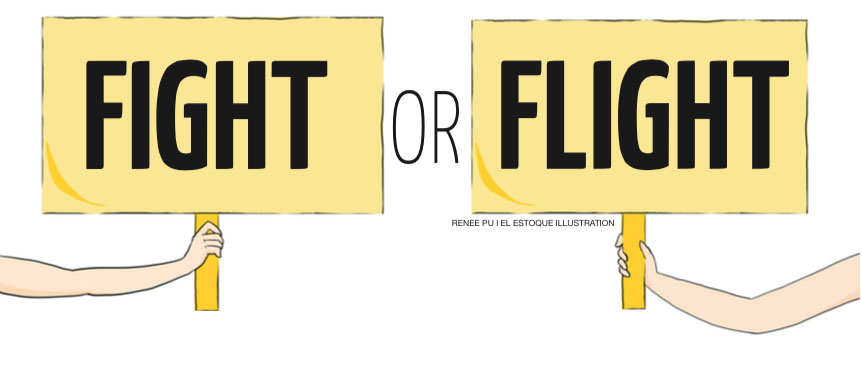Story written and reported by Neha Patchipala and Renee Pu
The crowd started to sing as it moved forward and senior Mariana Miranda sped up her pace. She looked through the posters held high in the air and tried to catch up with the youth leaders. Miranda was among the tens of thousands of participants in the Walk for Life West Coast event protesting abortion.
The protest took place in San Francisco on January 2016. Miranda took her chance to stand up and express her beliefs to people nationwide.
As a Catholic, Miranda developed her view toward abortions at a young age, and she felt a personal responsibility to protect lives that do not have the capacity to protect themselves.
Miranda moved from New York to California in the summer before her senior year, so this was her first time attending the peaceful rally. In California, she was introduced to this event by her mentor from the Charwick Study Center.
“I feel bothered and sad when people talk about [abortion] like that, as if it is completely okay,” Miranda said.
With new technology, Miranda and other young people in the protest are able to look deeper into abortion procedures, which have led them to believe that both the fetus and the mother will be hurt by an abortion.
Feeling a strong sense of compassion, Miranda attended the rally alongside other young people, determined to create a change.
Being vocal is a quality that resonates with senior Sun Hajela. Whether it be standing up for women’s rights during a Socratic seminar or commenting on a controversial Facebook post, Hajela makes it a point to speak her mind. But even Hajela has moments in which she can’t find her voice.
During swim practice this year, Hajela swam laps in a lane with another student when the person started insulting Hajela’s best friend. Hajela froze.
 “I didn’t say anything back and [the next day] when I told [my friend] what happened, she was like ‘Oh, you defended me right?’ and I was like ‘No,’” Hajela said. “It was one of the worst moments of my life.”
“I didn’t say anything back and [the next day] when I told [my friend] what happened, she was like ‘Oh, you defended me right?’ and I was like ‘No,’” Hajela said. “It was one of the worst moments of my life.”
She knew she should have stood up for her best friend, but for some reason, she just couldn’t. It’s during moments like these that Hajela believes that it’s important to stand up for what you believe in.
“If you believe in it and nobody hears you, then it doesn’t really matter whether or not you believe in it,” Hajela said.
Sharing a similar mindset, senior Ali Zaidi believes that people should be willing to discuss about their beliefs.
When the Supreme Court announced that same-sex marriage would be legal in all 50 states last June, Zaidi ended up having an unexpected, 45-minute conversation with his friend. They started out simply talking, which then turned into sharing their opinions about the topic. The discussion then progressed to debating the relationship between religion and government.

It wasn’t a conversation that they would have normally had, as it was solely contemporary, but Zaidi felt that it was important to express his opinions.
“If you don’t stand up for your beliefs,” Zaidi said, “then why are you living? You’re kind of just going through the motions of life if you don’t have something you believe in and you’re not willing to stand up for it.”
Nevertheless, standing up for one’s belief is not easy, and everyone has their own way of doing it. Silence doesn’t indicate a flight, as it often leads a person to realize their belief and gather their strength for the future.
Senior Juhi Shah was sitting in her AP Statistics classroom during a tutorial when she overheard two underclassmen arguing. She didn’t pay much attention to the conversation. Up until the she heard the word “retarded.”
Shah put down her pen and turned to face the two students. She opened her mouth and attempted to point out how they were not supposed to use the term as a way to belittle each other, but the students went on to other topics. In silence, Shah shook her head and turned back. Although Shah was eager to defend special needs children, she still felt uncomfortable butting into a conversation and to say what’s right or wrong. With a slight sense of dissatisfaction, Shah was determined to be more prepared and stand up for special needs kids in future events.
 Ever since she started volunteering at the Organization of Special Needs Families, Shah has developed unforgettable connections with special needs kids.
Ever since she started volunteering at the Organization of Special Needs Families, Shah has developed unforgettable connections with special needs kids.
“Outsiders usually see those children as people who need a lot of help and can’t do anything for their lives,” Shah said. “However, working as a volunteer, I can see that [special needs kids] are really smart; they just have trouble communicating [with others].”
Although Shah did not talk to the two students, she became more protective toward special needs children.
She decided that next time, she would speak up and tell others that it is not acceptable to judge someone else, especially these kids, without knowing what it is like being them.
“I want to speak up for them,” Shah said, “because they have a special place in my heart.”








